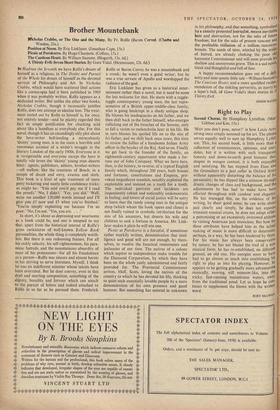Brother Mountebank
micholas Crabbe, or The One and the Many. By Fr. Rolfe (Baron Corvo). (Chatto and
Windus, 21s.) Position at Noon. By Eric Linklater. (Jonathan Cape, 15s.) Picnic at Porokorro. By Hugo Charteris. (Collins, 15s.) The Cautious Heart. By William Sansom. (Hogarth, 13s. 6d.) A Thirsty Evil: Seven Short Stories. By Gore Vidal. (Heinemann, 12s. 6d.)
tta Hadrian the Seventh we have Rolfe's dream of himself as a religious, in The Desire and Pursuit of the Whole his dream of himself as the devoted servant of Philosophy and Art. In Nicholas Crabbe, which would have scattered libel actions like a cornucopia had it been published in 1905 when it was probably written, Rolfe appears as a dedicated writer. But unlike the other two books, Nicholas Crabbe, though it incessantly justifies Rolfe, does not attempt to idealise him. The treat- ment meted out by Rolfe to himself is, for once, not entirely tender—and he plainly regarded this fact as ample justification for chucking acid about like a hoodlum at everybody else. For this novel, though it has an exceedingly silly plot about the hero-writer befriending a miraculously 'dainty' young man, is in the main a horrible and venomous account of a writer's struggle in the literary London of the early 1900s. Everyone in it is recognisable and everyone except the hero is totally vile (even the 'dainty' young man deserts him): agents, publishers, editors, brother-writers —all wallow, like the creatures of Bosch, in a cesspit of deceit and envy, avarice and sloth. This book is a kind of epic treatment of mere petty bickering and nastly little confidence tricks; as might be: 'You said you'd pay me if I read the proofs."No, I didn't."Yes, you did."Well, write me another 120,000 words instead and I'll give you £5 now and £5 when you've finished.' 'You're simply exploiting me because l'm so poor."No, I'm not."Yes, you are. . .
In short, it's about as depressing and wearisome as a book could be, and one is tempted to say that, apart from the historical interest of Rolfe's gross caricatures of well-known Yellow Book personalities, the whole thing is completely worth- less. But there is one redeeming feature. For all his sickly salacity, his self-righteousness, his para- noiac hatreds, and the mountainous absurdity of most of his pretensions—for all his fraudulence as a person—Rolfe was sincere and almost heroic in his striving to serve literature. Myself, I think
he was an indifferent minister whose talents have been overrated. But he does convey, even in this drab and snarling composition, something of the dignity, humility and fervour which can attach to the pursuit of letters and indeed attached to Rolfe in so far as he pursued them. Frederick Rolfe or Baron Corvo, he was a mountebank and a crook; he wasn't even a good writer; but he was a true servant of Apollo and worshipped the radiance of the god.
Eric Linklater has given us a historical enter- tainment rather than a novel, but it need be none the less welcome for that. He starts with a raggle- taggle contemporary young man, the last repre- sentative of a British upper-middle-class family, who is going bankrupt in a shady antique shop. He blames his inadequacies on his father, and we then shift back to the father himself, who emerges rollicking out of the trenches of the Somme, only to fall a victim to melancholia later in his life. He in turn blames his spoiled life on to the sins of his father, and we shift back once more, this time to review the follies of a handsome Indian Army officer in the heyday of the Raj. And so on. Finally we get back to the founder of the family, an eighteenth-century opportunist who made a for- tune out of John Company. What we have here, then, is the history, in reverse, of a typical English family which, throughout 200 years, built houses and fortunes, constitutions and Empires, pro- voked magnificent scandals, sensibly exploited the exploitable and insisted on a tooth for a tooth. The individual portraits and incidents are impenitently robust and noticeably undemocratic in feeling; and lovers of social justice will be sorry to learn that the randy young man in the antique shop (which whom the book opens and closes) is not finally ruined in symbolic retribution for the sins of his ancestors, but deserts his wife and children to seek a fortune in America. Mr. Link- later makes it plain he will win one.
Picnic at Porokorro is a forceful, if sometimes rather murkily written, demonstration that intel- ligence and good will are not enough, by them- selves, to resolve the fanatical resentments and jealousies of our time. The natives of a colony which aspires to independence make trouble for the Diamond Corporation, by which they have been on the whole justly administered and fairly provided for. The Provincial Commissioner arrives, bluff, Scots, loving the natives of the country to which he has devoted his life, thinking to quiet such essentially lovable people by a mere demonstration of his own presence and good humour. But something has entered in unknown in his philosophy, and that something, symbolised by a cannily presented journalist, means inevitable hate and destruction, not for the sake of future freedom, but for the sake of present rancour and the profitable titillation of a million rancorous breasts. The sands of time, whirled by the winds of hatred, are already choking the poor old humanist Commissioner and will soon provide ills shallow and anonymous grave. This is a sad novel, bleak and thoughtful and full of fear.
A happy recommendation goes out of a del■ witty and near-poetic little tale—William Sansom The Cautious Heart; and a more qualified worn' mendation of the tinkling perversity, as merry as a leper's bell, of Gore Vidal's short stories in Thirsty Evil.
SIMON RAY


































 Previous page
Previous page